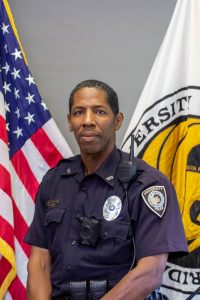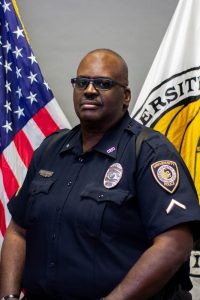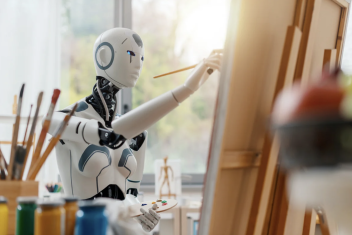The smell of jet fuel still transports UCF Police officer Eric Walton to the Pentagon — even 20 years later.
Walton and fellow UCFPD officer Joel Witherspoon were two of the first responders who responded to the terrorist attacks in New York, Washington D.C., and Pennsylvania.
Nearly 3,000 people were killed on 9/11, making it the deadliest day in United States history. Countless others were wounded or have since passed away due to lingering effects of the tragedy.
As we mark the 20th anniversary of the day the world changed, Witherspoon and Walton share their experiences and the significance that 9/11 still holds for them.
Ground Zero
Witherspoon, who joined the New York Police Department in 1984, remembers the call coming over the radio when the plane hit the north tower.
“My partner and I had just finished our breakfast and had started our patrol,” says Witherspoon. “When we heard about the first plane, we thought it was just a terrible accident.”
After the second plane hit, Witherspoon knew something was very wrong and his police instincts kicked in.

“From that point on, we knew something was going on, but we still didn’t know what,” he says. “But the radio started getting really crazy, and then they started mobilizing us, calling us in to go to different locations.”
Although Witherspoon and his partner weren’t sent to the World Trade Center immediately, in the days that followed, he was one of the officers stationed at Ground Zero to ensure the security of the scene.
“Everything was covered in gray soot and ashes — the whole street, the buildings, everything,” Witherspoon says. “It was just eerily quiet, obviously there were no people there other than the cops responding. It was definitely something out of the scene of a movie.”
Witherspoon later found out that one of his friends, a firefighter with the New York Fire Department, had died while responding to the towers.
“He was one of the first firemen to get into the building and he unfortunately lost his life,” says Witherspoon. “It definitely had an effect on me personally, big time.”
Of the 2,753 people killed in the attack at the World Trade Centers, 343 firefighters and paramedics, 23 New York City police officers, and 37 Port Authority police officers died.
Pentagon Targeted
On the morning on September 11, 2001, Walton was at the FBI Academy in Quantico, Virginia, for training.
When the planes hit the twin towers in New York, Walton and other officers at the academy stopped like many other Americans to watch the news on television in horror at what was unfolding.
Then, news broke that another plane had hit the Pentagon.

“We were scheduled to go to the Pentagon probably an hour before the plane hit it,” Walton says. “When the plane hit, they asked for all first responders to come because they needed assistance.”
Once they reached the scene, Walton says none of his training could prepare him for what he saw.
“The building kind of looked like a dry cake,” says Walton. “Part of it was standing and another part was just missing. It was unreal to see half a plane sitting in the middle of a building.”
Walton was part of the search and rescue mission and stayed for several days, working 12 to 18-hour shifts. Officers slept on scene in cots and sleeping bags.
“You think about what you’ve seen, what you saw,” says Walton. “With time the images kind of fade away, but for the first five years after, I didn’t want to talk about it. When I smell jet fuel, that smell takes me back.”
Walton later learned that 184 people were killed in the attack on the Pentagon. An additional 40 were killed on a fourth plane that crashed in a field in Shanksville, Pennsylvania, after passengers on the plane fought back against the hijackers.
“The things that we saw were not something that you want to keep remembering,” says Walton. “But the one big thing that I always remember is how law enforcement came together, from Virginia to Maryland. There wasn’t one agency that wasn’t out there.”
Remembering Those Taken 20 Years Later
Countless first responders and civilians were impacted by the attack in New York, Washington, D.C. and Pennsylvania and those who were there will likely never forget what they saw.
But instead of focusing on the death and destruction of that day, Witherspoon likes to remember the days after and how the nation came together.
“It was the first time in my life that I saw so many people come together for a common cause,” he says. “You never think something like that would happen, but it did. I think we just always need to remember the loved ones who lost someone and support them.”


